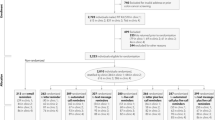Abstract
Purpose To determine the impact of an electronic reminder upon the timeliness and proportion of patients referred for evaluation of a positive fecal occult blood test and receipt of colonoscopy. Methods Outpatients (468) with a positive occult blood test were prospectively identified and had a note entered into their electronic medical record prompting their provider to act upon this result. The results were compared to 634 control patients from the prior year. Results The intervention was associated with a 20.3% absolute increase in gastroenterology consultation within 14 days (P < 0.001) and significantly prompter consultation. The median time to colonoscopy decreased by 38 days during the intervention (P = <0.0001). A multivariable model found that the intervention was significantly associated with shorter time to consultation and colonoscopy. Conclusion A simple electronic reminder is associated with a significant improvement in the proportion of patients referred for, and timeliness of, evaluation of a positive FOBT.

Similar content being viewed by others
References
Jemal A, Siegel R, Ward E, Murray T, Xu J, Thun MJ. Cancer statistics 2008. CA Cancer J Clin. 2008;58(2):71–96. doi:10.3322/CA.2007.0010.
Mandel JS, Church TR, Bond JH, et al. The effect of fecal occult-blood screening on the incidence of colorectal cancer. N Engl J Med. 2000;343:1603–1607. doi:10.1056/NEJM200011303432203.
Hardcastle JD, Chamberlain JO, Robinson MH, et al. Randomized controlled trial of faecal-occult-blood screening for colorectal cancer. Lancet. 1996;348:1472–1477. doi:10.1016/S0140-6736(96)03386-7.
Kronborg O, Fenger C, Olsen J, Jorgensen OD, Sondergaard O. Randomized study of screening for colorectal cancer with faecal-occult-blood test. Lancet. 1996;348:1467–1471. doi:10.1016/S0140-6736(96)03430-7.
Etzioni DA, Yano EM, Rubenstein LV, et al. Measuring the quality of colorectal cancer screening: the importance of follow-up. Dis Colon Rectum. 2006;49:1–9. doi:10.1007/s10350-006-0533-2.
Pignone M, Rich M, Teutsch SM, Berg AO, Lohr KN. Screening for colorectal cancer in adults at average risk: a summary of the evidence for the U.S. Preventive Services Task Force. Ann Intern Med. 2002;137:132–141.
Myers RE, Turner B, Weinberg D, et al. Impact of a physician-oriented intervention on follow-up in colorectal cancer screening. Prev Med. 2004;38:375–381. doi:10.1016/j.ypmed.2003.11.010.
Levin B, Murphy GP. Revision in American Cancer Society recommendations for the early detection of colorectal cancer. CA Cancer J Clin. 1992;42:297–299. doi:10.3322/canjclin.42.5.296.
Winawer S, Fletcher R, Rex D, et al. Gastrointestinal consortium panel: gastrointestinal consortium panel. Colorectal cancer screening and surveillance: clinical guidelines and rationale-update based on new evidence. Gastroenterology. 2003;124:544–560. doi:10.1053/gast.2003.50044.
Lurie JD, Welch HG. Diagnostic testing following fecal occult blood screening in the elderly. J Natl Cancer Inst. 1999;91:1641–1646. doi:10.1093/jnci/91.19.1641.
Shields HM, Weiner MS, Henry DR, et al. Factors that influence the decision to do an adequate evaluation of a patient with a positive stool for occult blood. Am J Gastroenterol. 2001;96:196–203. doi:10.1111/j.1572-0241.2001.03475.x.
Yabroff KR, Washington KS, Leader A, Neilson E, Mandelblatt J. Is the promise of cancer-screening programs being compromised? Quality of follow-up care after abnormal screening results. Med Care Res Rev. 2003;60:294–331. doi:10.1177/1077558703254698.
Turner B, Myers RE, Hyslop T, et al. Physician and patient factors associated with ordering a colon evaluation after a positive fecal occult blood test. J Gen Intern Med. 2003;18:357–363. doi:10.1046/j.1525-1497.2003.20525.x.
Sharma VK, Vasudeva R, Howden CW. Colorectal cancer screening and surveillance practices by primary care physicians: results of a national survey. Am J Gastroenterol. 2000;95:1551–1556. doi:10.1111/j.1572-0241.2000.02093.x.
Myers RE, Hyslop T, Gerrity M, et al. Physician intention to recommend complete diagnostic evaluation in colorectal cancer screening. Cancer Epidemiol Biomarkers Prev. 1999;8:587–593.
Baig N, Myers RE, Turner BJ, et al. Physician-reported reasons for limited follow-up of patients with a positive fecal occult blood test screening result. Am J Gastroenterol. 2003;98:2078–2081. doi:10.1111/j.1572-0241.2003.07575.x.
Department of Veterans Affairs, Veterans Health Administration: Colorectal Cancer Screening. VHA Directive 2007-004. January 12, 2007.
El-Serag HB, Petersen L, Hampel H, Richardson P, Cooper G. The use of screening colonoscopy for patients cared for by the Department of Veterans Affairs. Arch Intern Med. 2006;166:2202–2208. doi:10.1001/archinte.166.20.2202.
Weaver FM, Smith B, LaVela S, et al. Interventions to increase influenza vaccinations rates in veterans with spinal cord injuries and diseases. J Spinal Cord Med. 2007;30:10–19.
Deyo RA, Cherkin DC, Ciol MA. Adapting a clinical comorbidity index for use with ICD-9-CM administrative databases. J Clin Epidemiol. 1992;45:613–619. doi:10.1016/0895-4356(92)90133-8.
Nadel MR, Shapiro JA, Klabunde CN, et al. A national survey of primary care physicians’ methods for screening for fecal occult blood. Ann Intern Med. 2005;142:86–94.
Balas EA, Weingarten S, Garb CT, Blumenthal D, Austin Boren S, Brown GD. Improving preventive care by prompting physicians. Arch Intern Med. 2000;160:301–308. doi:10.1001/archinte.160.3.301.
Ferreira MR, Dolan NC, Fitzgibbon ML, et al. A health-care provider-directed intervention of increase colorectal cancer screening among veterans: result of a randomized controlled trial. J Clin Oncol. 2005;23:1548–1554. doi:10.1200/JCO.2005.07.049.
Selinger RR, Norman S, Dominitz JA. Failure of health care professionals to interpret fecal occult blood tests accurately. Am J Med. 2003;114:64–67. doi:10.1016/S0002-9343(02)01350-5.
Acknowledgments
We are grateful to Paul Nichol M.D., Toan D. Nguyen M.D., Molly Aldassy R.N., and Mauri Miner for their participation in the quality improvement program that prompted this study and to David Weinberg, M.D., MSc, for his thoughtful review and comments. Jason Dominitz is supported by an American Society for Gastrointestinal Endoscopy Endoscopic Career Development Award. This material is the result of work supported by resources from the VA Puget Sound Health Care System, Seattle, Washington.
Author information
Authors and Affiliations
Corresponding author
Additional information
The views and opinions of the authors expressed herein do not necessarily state or reflect those of the United States Government or the Department of Veterans Affairs. This study was approved by the University of Washington Institutional Review Board on September 26, 2006.
Rights and permissions
About this article
Cite this article
Larson, M.F., Ko, C.W. & Dominitz, J.A. Effectiveness of a Provider Reminder on Fecal Occult Blood Test Follow-up. Dig Dis Sci 54, 1991–1996 (2009). https://doi.org/10.1007/s10620-009-0751-2
Received:
Accepted:
Published:
Issue Date:
DOI: https://doi.org/10.1007/s10620-009-0751-2




